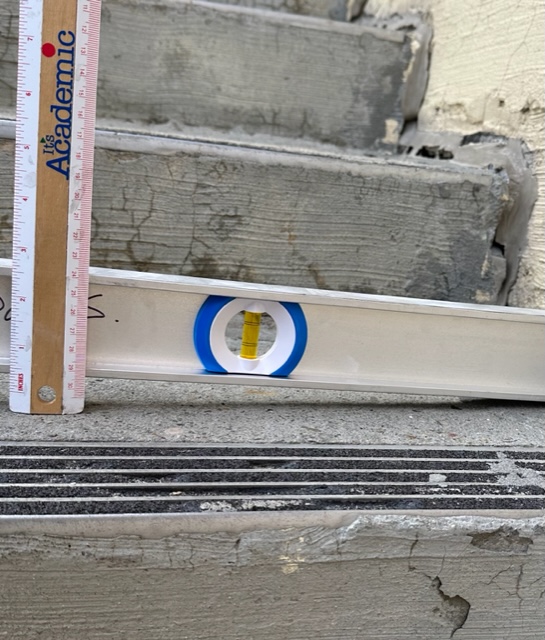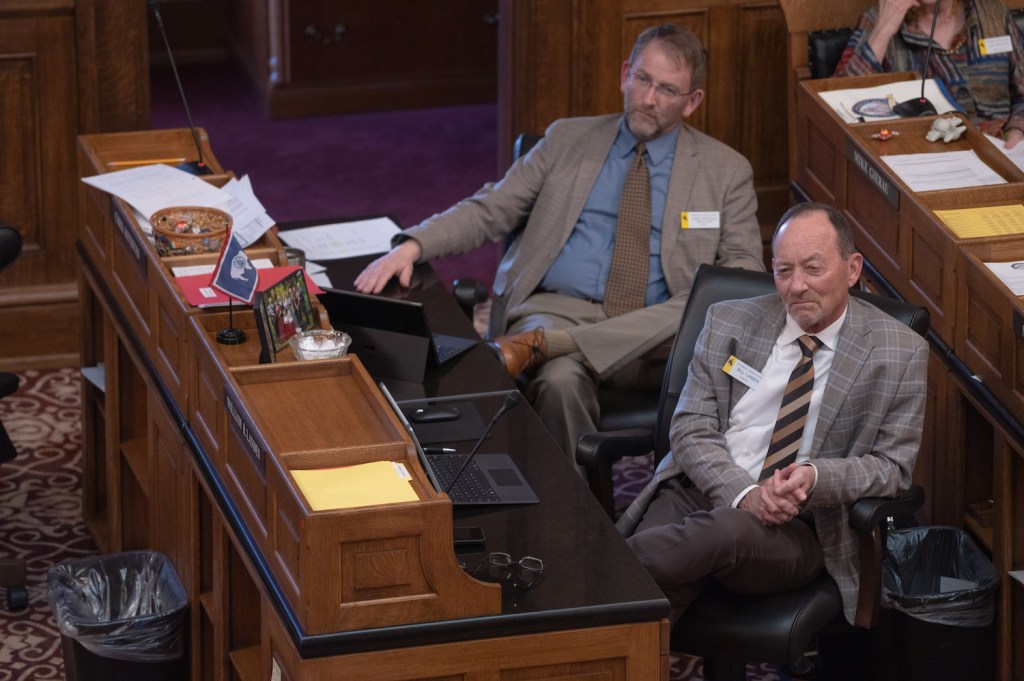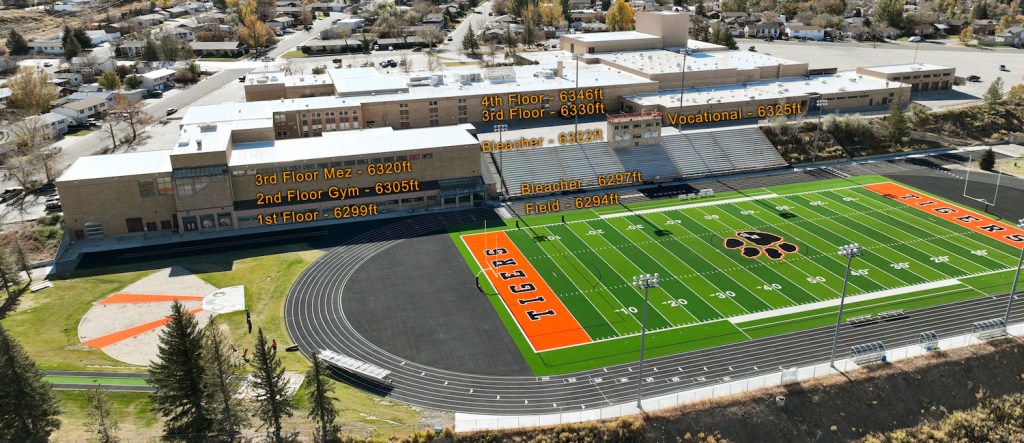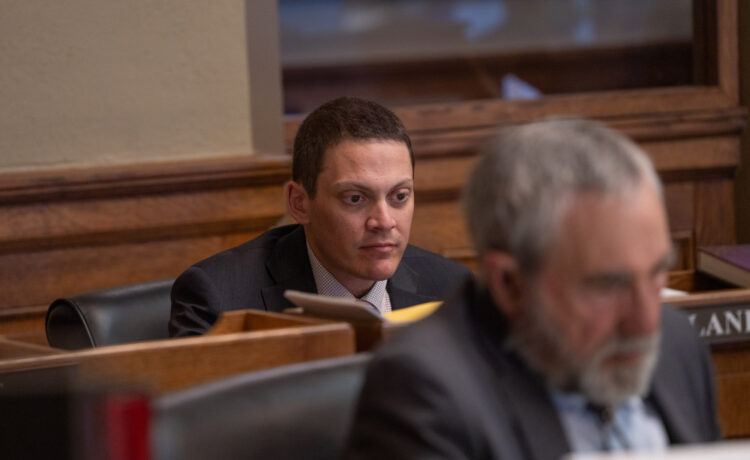In the Rock Springs High School’s woodshop, a large crack crawls up a brick wall, evidence of the 53-year-old building’s extensive shifting and settling. Extension cords bunch around outlets in nearby classrooms in an attempt to accommodate computer systems they weren’t built for. An average of 27 kids learn in classrooms designed for 20-25. The cafeteria is so undersized that the school would need seven lunch periods to accommodate a closed campus.
“You’ve got classrooms shoehorned into custodial closets,” Sweetwater District #1 Superintendent Kelly McGovern said. “I mean, it’s just ridiculous. It’s time for a new school.”
The district has been trying to secure state funding to help with a new building for years, and had gained a spot on the list of projects slated for school construction dollars in the state budget. But in working up its budget bill for the next two years, the Senate by a single vote cut design and construction funding for seven school projects totaling $111 million. Rock Springs was among those on the chopping block.
The House, meanwhile, approved the school construction funds. The Joint Conference Committee — a group of House and Senate negotiators assembled by legislative leadership — is now tasked with hammering out the chambers’ differences. School leaders like McGovern are hoping the panel salvages the funding.

“There’s still time to fund a new Rock Springs High School, which we desperately need,” McGovern said from Cheyenne, where she is working to convince lawmakers. “It is not too late. But we’ve got to look at the facts and the need, and then address those needs as the state is supposed to do. The state is accountable to fund schools.”
The Senate version of the budget also axed design and construction funds for schools in Teton, Campbell, Laramie, Niobrara and Goshen counties.
Opponents of the cuts included Sen. Affie Ellis (R-Cheyenne), who pointed out that Arp Elementary School in Laramie County, located in south Cheyenne, was chosen for funding because it’s a major health and safety concern. After it was determined to be infested with rodents and had backed-up sewers, the school was closed, necessitating busing children across town.
“Let me say that again, sewage,” Ellis said. “That’s what our kids are learning in.”
A question of fidelity
Lawmakers leading the effort to strip the funds couched it as a way to right a procedural wrong.
“I’m really concerned that we need to have a high degree of fidelity to the process, and how we go about funding these projects,” Sen. Larry Hicks (R-Baggs,) said on the Senate floor when he proposed the amendment that cut funding last week.
Wyoming allocates funds through its State Construction Department and Select Committee on School Facilities. The department provides reports and information on projects, and the committee approves spending on school-facilities projects and makes funding recommendations to the Legislature.
In this case, Hicks, who is a member of that committee, said some schools were pushed to the front of the line without going through the appropriate study routes — which he likened to “putting the cart before the horse.” Rather than relying on state studies to guide the process, he said, districts are furnishing their own studies.
Other lawmakers pushed back, saying the process was above board.
“These recommendations … were the recommendations from the School Facilities Committee, through the interim work based on all the testimony received,” said Sen. Chris Rothfuss (D-Laramie), who also sits on the committee. “So this is what the process has arrived at.”

Rep. Landon Brown (R-Cheyenne) chairs the committee. He told WyoFile the committee absolutely had the authority to put Rock Springs and Jackson — two schools accused of jumping the line — on its funding list. There are provisions for exceptions to the state’s ranking system.
Co-chair Sen. Bill Landen (R-Casper) echoed that the board operated correctly. “We had a couple of big high schools that bubbled to the top in terms of the capacity, conditioning, all of the things that we consider,” he said.
“We did nothing really very different than has ever been done before,” Landen continued. “So I take a little exception to that notion that we didn’t follow any sort of rules or regulations.”
The late-in-the-game budget amendment maneuver disregards the committee’s work, Brown said. “This was nine months of extremely hard work by a very dedicated group of people,” he said.
A similar amendment to strip construction funding was proposed in the House, but failed to pass.
The result of the Senate amendment on Rock Springs, Brown continued, would be for the state to pay $8 million to cover a superficial facilities issue, known as a “backflow preventer for maintenance.” School officials, he said, have “told us ‘we don’t need the $8 million backflow preventer … if you do that it’s not going to fix the other major issues that we have facing us in the next 10 to 15 years. We’re going to have catastrophic failure.’”
The Senate’s amendment, Rep. Brown said, “only puts us further behind. It only costs us more money. So I think this is a really, really sad day for Wyoming to see our kids not be educated in proper schooling facilities.”
One Rock Springs senator, Republican John Kolb, voted for the amendment that stripped the money. Another, Republican Stacy Jones, voted against it.
“This building is failing,” Jones said of her town’s high school, adding that “just doing this maintenance is just a bandaid.”
Failing infrastructure
Sweetwater County District #1, home to Rock Spring High, acquired land in 2006 to replace its current high school. Since 2014, McGovern said, the district has carefully followed the state’s process, studying the costs and benefits of every alternative, to obtain funds for new school construction.
State-conducted and independent studies have documented building deficiencies that don’t meet educational standards, she said — one state assessment rated 74% of the systems in the school’s infrastructure as “fair to poor.”
“So the systems, anything you can think of in a school, three-quarters of them are on their way to failing,” McGovern said.

Along with extensive repairs, the school has few options for relocating students to make those repairs. Building a new high school, McGovern said, is the smarter, more financially prudent decision for Wyoming and Sweetwater County.
“We’ve abided by the statutes,” McGovern said. “We have used major maintenance money appropriately for the uses that it’s intended for, but it does not keep up with the adequacy standards that the school should have.”
Any notion that Sweetwater is receiving favorable treatment or hasn’t followed the rules, she said, “is simply false.”
All or nothing?
Watching the Senate strip the funding, Teton County School Board Chair Bill Scarlett, who has also been working on a school project that lost its funding, said he felt “disappointment.”
“It appears that the deciding votes to strip the funding were based on an argument of process, and I don’t know how much more of the process and the changing process districts can do than what we all have been doing,” he said. “We’ve got to stop spending money on process, and we’ve got to start spending money on what will help children be successful.”
What’s at stake, he said, is quality and appropriate education for the state’s students.
In Teton County, the student population is quickly outgrowing its high school. The building was completed before the state took over school construction, and therefore doesn’t meet the state standards, Scarlett said. Administrators stripped lockers to create more room, but that means students don’t have personal storage spaces.
In addition, the district needs to retrofit spaces to accommodate necessary career and technical education, he said. The community has already funded much of the work with a special excise tax, which enabled it to move its sports facilities to make way for career, technical and other uses.
The state-fund-related portion of the project, Scarlett said, is “a cost-effective solution for future overcrowding of our high school.”
Teton and Sweetwater districts have representatives in Cheyenne and hope to salvage funding.
The Joint Conference Committee convened Wednesday night to begin the process of bridging the two budget versions. Committee member Rep. Clark Stith (R-Rock Springs) asked what happened with school facility funding: “It looks like the Senate removed about $110 million worth of K-12 school construction and I just wanted to find out … what you were thinking.”
Co-chair Sen. Dave Kinskey (R-Sheridan) responded that the intent was to make sure the list of schools to be constructed conforms with statutory and regulatory requirements established by earlier lawsuits regarding how schools are paid for. (The Wyoming Supreme Court in 1995 confirmed the state’s responsibility to finance public education in the state, including capital construction. The Wyoming Education Association in 2022 sued Wyoming, asserting that the state has violated the Wyoming Constitution by failing to fund public schools adequately. A trial is scheduled for June.)
Stith responded with a dry question: “So it’s the Senate’s position that you thought it would be less likely to be subject to attack, judicially, if you spent $0 on new construction?”
On Thursday, the House offered a package that reinstates most of the capital construction funds.














